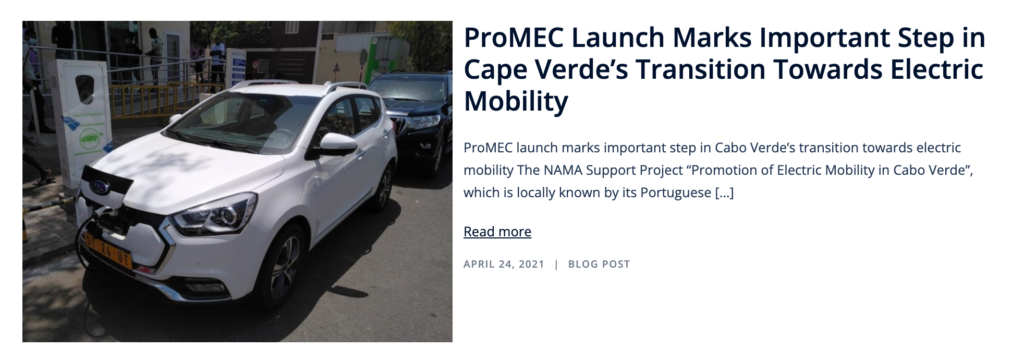TARGETS AND ACTIONS ON TRANSPORT DECARBONISATION
Cape Verde consists of 10 volcanic islands in the Atlantic ocean and air travels are the major mode of travel between the islands. Thus, transport accounts for 40.8% of energy-related CO2 emissions as of 2010. A shift to a clean transport is needed. According to the Power Sector Master Plan 2018-2040, Cape Verde can reach by 2030 about 54% of electric energy production through renewable sources.
In 2018, the policy for electric mobility was approved with the objective of gradually replacing vehicles equipped with combustion engines (gasoline or diesel) by clean electric vehicles, eliminating greenhouse gases emissions until 2050. This policy will be supported by the NAMA Facility. 175 charging points will be installed and by the end of 2024, 5% of vehicles sold should be electric.
BEST PRACTICES
ProMEC Launch Marks Important Step in Cape Verde’s Transition Towards Electric Mobility
The NAMA Support Project “Promotion of Electric Mobility in Cape Verde”, which is locally known by its Portuguese acronym ProMEC, was formally launched in a virtual meeting on 16 March 2021. During the launch, which was attended by approx. 60 stakeholders from the public and private sectors, the Minister of Industry, Commerce and Industry, Alexandre Monteiro stressed that the project will greatly contribute to the implementation of Cape Verde’s Electric Mobility Policy and Action Plan adopted in February 2019. He stated that the government is promoting electric vehicles (EV) to decarbonize the road transport sector “that absorbs approx. 30% of the total domestic consumptions of imported fossil fuels”. These fuels can be substituted with electricity that is locally generated with renewable energy and set to contribute 54 % to the country’s electricity mix by 2030, as explained by Rito Évora, the National Director of Industry, Commerce and Energy (in 2019 the share was 18.4 %). The government of Cape Verde therefore set itself the objective to convert the fleet of the public administration to electric vehicles by 2030 and phase out conventional vehicles by 2050, which is a first on the African continent.
CAPE VERDE'S NATIONALLY DETERMINED CONTRIBUTION
UPDATES
FURTHER INFORMATION
- Apresentacao_do_projeto_ProMEC_LMT
- Cape Verde’s Electric Mobility Policy Charter
- Cape Verde Electricity Sector Master Plan (2018 – 2040)
- Cape Verde First NDC (English Version)
- Cape Verde First NDC (English Updated Version)
- NAMA Facility: Cape Verde – Promotion of Electric Mobility
- Nationally Determined Contribution of Cape Verde
- News piece ProMEC launch
- ProMEC Launch Marks Important Step in Cape Verde’s Transition Towards Electric Mobility
- Renewable Energy Support Program (2016 – 2020)
- UNDP-GEF, Project Title: Cape Verde Appliances & Building Energy-Efficiency Project (CABEEP)



